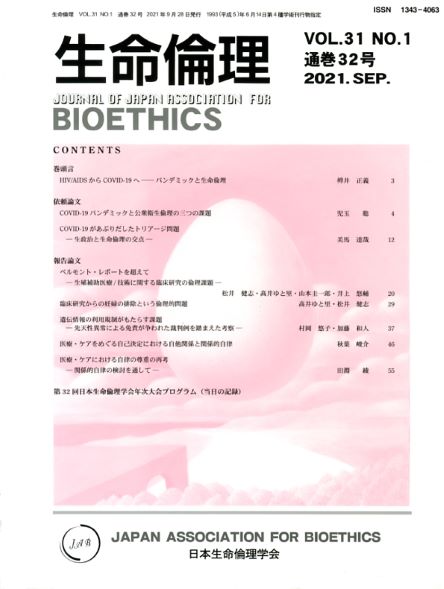Volume 31, Issue 1
Displaying 1-12 of 12 articles from this issue
- |<
- <
- 1
- >
- >|
Contents
-
2021Volume 31Issue 1 Pages 1-2
Published: September 28, 2021
Released on J-STAGE: August 01, 2022
Download PDF (477K)
Foreword
-
Article type: Foreword
2021Volume 31Issue 1 Pages 3
Published: September 28, 2021
Released on J-STAGE: August 01, 2022
Download PDF (605K)
Invited Articles
-
Article type: Invited Articles
2021Volume 31Issue 1 Pages 4-11
Published: September 28, 2021
Released on J-STAGE: August 01, 2022
Download PDF (698K) -
Article type: Invited Articles
2021Volume 31Issue 1 Pages 12-19
Published: September 28, 2021
Released on J-STAGE: August 01, 2022
Download PDF (700K)
Reports
-
Article type: Reports
2021Volume 31Issue 1 Pages 20-28
Published: September 28, 2021
Released on J-STAGE: August 01, 2022
Download PDF (722K) -
Article type: Reports
2021Volume 31Issue 1 Pages 29-36
Published: September 28, 2021
Released on J-STAGE: August 01, 2022
Download PDF (725K) -
Article type: Reports
2021Volume 31Issue 1 Pages 37-45
Published: September 28, 2021
Released on J-STAGE: August 01, 2022
Download PDF (704K) -
Article type: Reports
2021Volume 31Issue 1 Pages 46-54
Published: September 28, 2021
Released on J-STAGE: August 01, 2022
Download PDF (714K) -
Article type: Reports
2021Volume 31Issue 1 Pages 55-63
Published: September 28, 2021
Released on J-STAGE: August 01, 2022
Download PDF (711K)
Program of the 32th Annual Meeting
-
Article type: other
2021Volume 31Issue 1 Pages 65-72
Published: September 28, 2021
Released on J-STAGE: August 01, 2022
Download PDF (673K)
-
Article type: other
2021Volume 31Issue 1 Pages 73
Published: September 28, 2021
Released on J-STAGE: August 01, 2022
Download PDF (481K)
-
Article type: other
2021Volume 31Issue 1 Pages 74
Published: September 28, 2021
Released on J-STAGE: August 01, 2022
Download PDF (484K)
- |<
- <
- 1
- >
- >|
